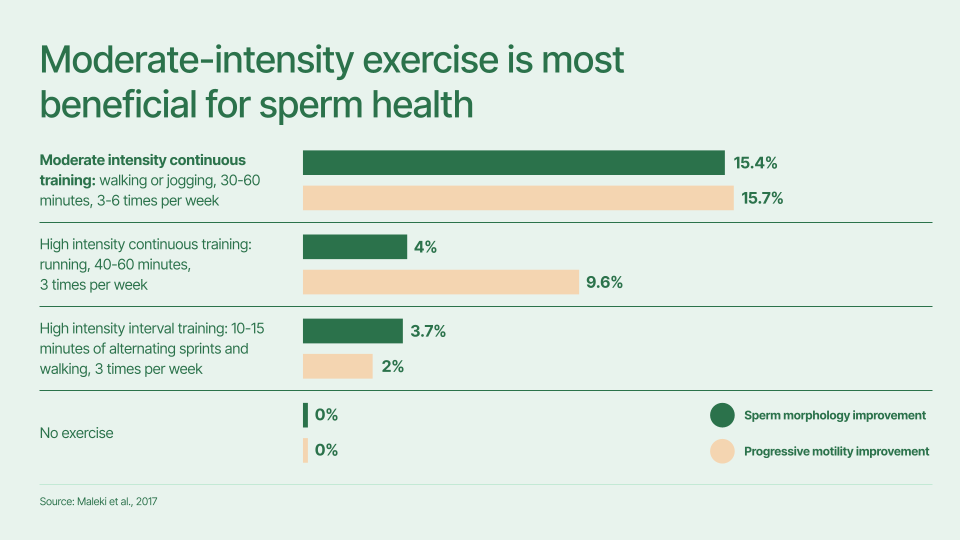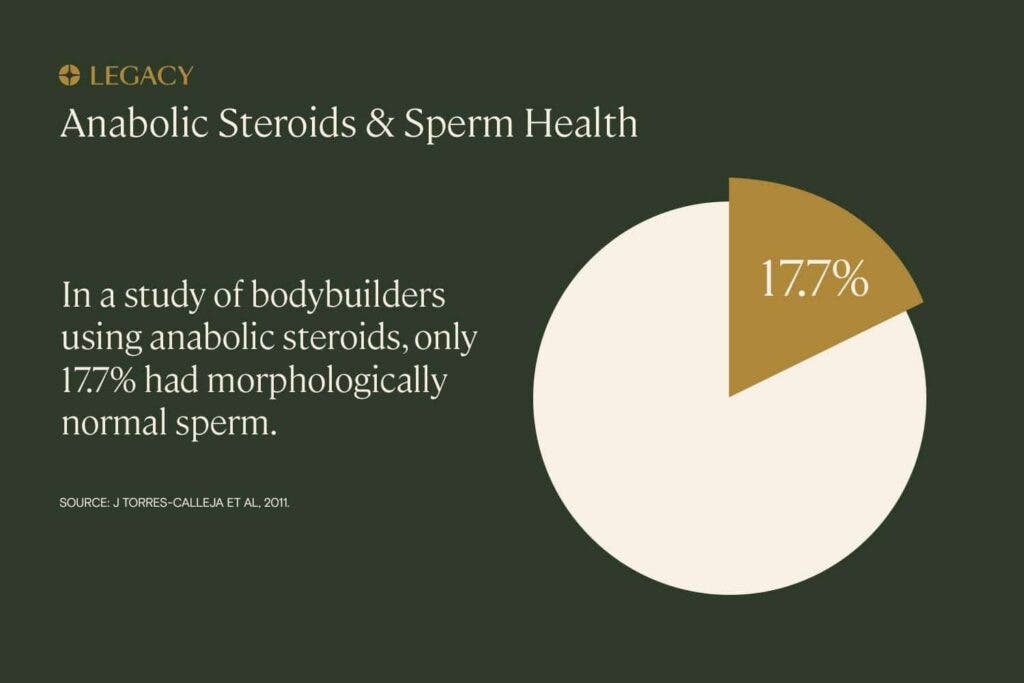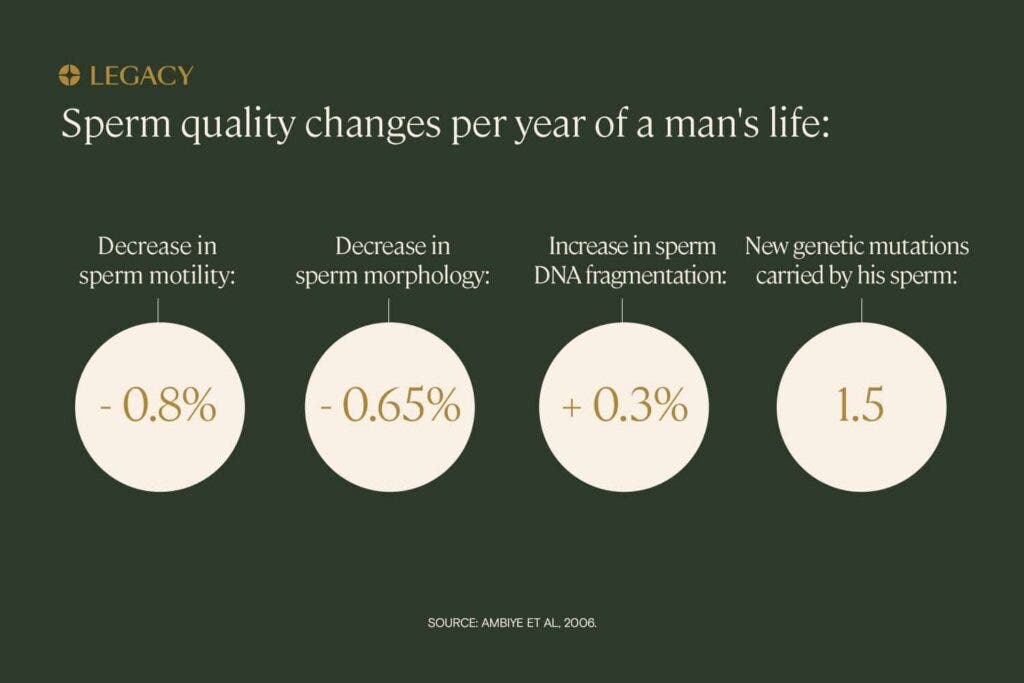We know a sedentary lifestyle is bad for sperm. So, being an athlete must be great for sperm, right? Well, yes and no. Research has found that some forms of exercise — and athletic supplements — can actually be detrimental to male fertility. That’s why we recommend sperm freezing for all athletic men.
Key takeaways
- Does exercise increase sperm quality? Moderate exercise does; intense exercise might actually impair sperm production.
- Some protein powders have been found to contain toxins and undeclared anabolic steroids that can impact male fertility.
- If you’re an athlete or intense exerciser, testing and freezing your sperm can preserve your optimal fertility.
We’re not just talking about sperm freezing for professional athletes here. Even if you have a day job, guys who prioritize their sport should consider preserving some of their youngest, healthiest sperm.
Extreme training can impact sperm quality.
Do athletes have better sperm? While physical activity is associated with improved sperm health, too much exercise can negatively affect male fertility.
According to research, intense exercisers tend to have lower semen parameters. One review of studies found that cyclists and mountain climbers had lower sperm concentrations after periods of intensive exercise.1 Studies have also found that endurance athletes — such as marathoners — have lower average levels of testosterone, a hormone that’s crucial for sperm production, than other men.2 Going HAM in the gym (or wherever) releases stress hormones, which may impair sperm production.
Studies have found that moderate exercise, defined as 30–60 minutes of walking or jogging 4–6 times per week, resulted in the most improved sperm.3

Cycling squashes your scrotum.
Pressure from bike seats can compress nerves and arteries that supply the area with blood. That’s no good for your sperm (and, potentially, your erection). Yes, this includes your Peloton.
Plus, the testicles hang outside the body to keep them 2-8°C cooler than core body temperature — and certain exercises can raise scrotal temps, impacting sperm production. have found that race-car drivers and cyclists both experience this impact.4 Researchers wrote that, for men participating in these activities, “spermatogenesis may be altered and even completely inhibited” due to the increase in testicular temperature.
Learn more about cycling and your sperm health.
Protein shakes contain hidden sperm-killers.
Some protein powders contain undeclared ingredients, including anabolic steroids and androgens, that can disrupt testosterone and sperm production. In fact, one study that looked at 30 protein supplements found the anabolic steroid 4-androstenedione in 37% of them.5 Anabolic steroids contain are synthetic forms of testosterone; adding an external source of testosterone can disrupt the balance of male fertility hormones, and potentially turn off the body’s natural T production.

What’s more: In 2021, the Clean Label Project found that many protein powders contain heavy metals, bisphenol-A (BPA, a “forever chemical” and known endocrine disruptor), pesticides, or other contaminants that can impact fertility. One protein powder contained 25 times the allowed limit of BPA6.
So it’s perhaps unsurprising that another study found men who stopped drinking protein shakes nearly tripled their sperm concentration within months.7
Olympians do it.
During the 2016 Olympics, a Zika virus outbreak inspired UK long jumper Greg Rutherford and US basketball player Pau Gasol to freeze their sperm, safeguarding it against the virus’s potential to be sexually transmitted and cause birth defects.
The other thing Olympians are doing? Having safe sex, hopefully. At this year’s Paris Games, organizers distributed more than 300,000 condoms to athletes residing in the Olympic Village. This is good news for STI prevention — and sperm health. Gonorrhea, chlamydia, herpes, HIV, HPV, mycoplasma/ureaplasma, and other STIS can affect fertility by damaging tubes within the testicles where sperm are produced, impairing sperm quality and concentration.
Your current sperm is probably your peak sperm.
You may look (and feel) younger than ever, but your sperm don’t have the same longevity. Sperm quality, measured by the total number of swimming sperm in a sample, drops about 1% per year after age 30.
More importantly, older sperm is more likely to carry genetic defects. Sperm DNA fragmentation, the percentage of sperm that contain sperm with broken or incomplete genetic material. This can affect fertility and the health of your future child; after 40, your chances of producing a child with neurological disorders is 4x higher.
Your sperm will never be younger than they are today, and if you’re working out (moderately), eating well, and taking care of your body, you can freeze a high quality sample as a back-up for later.

It’s easy.
Way easier than your daily workout routine (or that workout routine you meant to start months ago). Legacy’s at-home test kit makes the process simple. Just provide a sample and we’ll store it securely in two locations from 1 to 25 years.
Get started with at-home sperm freezing.



